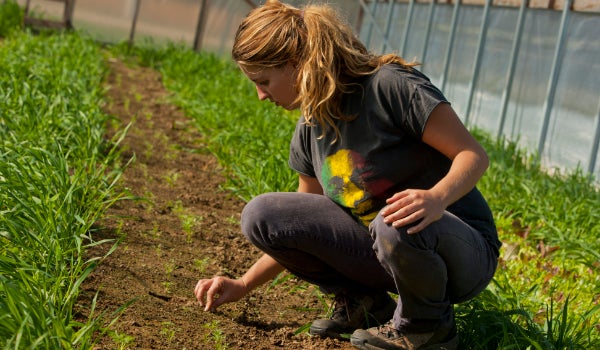Solar panels at the University of Rhode Island
If you think “sustainability” is just another buzzword, you haven’t seen URI transform that noun into action.
Across the University, sustainability is integral to interdisciplinary academics, energy efficient construction, and serious campus-wide change—from swapping out light fixtures to altering human behavior. Those efforts, and others, have earned the University a U.S. Department of Education designation as a 2018 Green Ribbon School for sustainability.
Now, with URI and town partners having developed one of the largest solar energy projects in New England, sustainability has a highly visible presence. The initiative includes a solar array at the northwestern edge of the Kingston campus and promises economic and environmental benefits to all its partners, as well as a hands-on setting for learning about solar energy.
“I think this is a natural integration into coursework. Having solar energy on campus in such a prominent way provides an excellent learning experience,” said Gretchen Macht, assistant professor of industrial and systems engineering in the College of Engineering and instructor of the new Solar Energy Systems course.
“URI’s solar initiative ties well into our class, and it is a great learning opportunity because we get to visit some of the new systems and use them as case studies,” said Gabby Aiello, an industrial and systems engineering major who is minoring in sustainability and engineering entrepreneurship.
The University offers 30 graduate and undergraduate degrees that include sustainability as a learning outcome, as well as an interdisciplinary minor in the subject. Macht’s solar energy class is a general education elective and a Grand Challenge course that studies the methods, economic criteria, and background for assessing the systems of solar energy conversion technologies with a focus on the human component, from the perspectives of psychology, organizational behavior, cultural beliefs and more.
“I know that the future of energy is green and that there is a need for more industrial engineers in the power industry,” Aiello said of the career applications of her sustainability education.
Yi Zheng, assistant professor of mechanical engineering, introduced a new class in fall 2018 called Solar Thermal Engineering. It covers principles of solar engineering, material characteristics and applications, and tools designed for passive and active solar heating/cooling systems.
Zheng welcomes URI’s solar energy project and would like to see even a greater embrace of solar energy on campus. “Installation of solar panels, testing fields, and solar research labs on campus allow researchers like myself to integrate our solar work with the real world,” he said. “I hope the solar energy initiative at URI will help promote research and the industry greatly in the state. More people would understand and discuss solar energy.”
Macht also leads a Sustainable Innovative Solutions Laboratory, where she and her students focus on applying human factors to the systems level of sustainability using optimization and statistical techniques.
“I’m really concerned with behavior and how people understand and adopt sustainability and make decisions,” she said. “We need to look at it from a holistic perspective and see different elements and how to interact to get the outcome we want. We can’t design in a bubble, so we bring in different professions for different perspectives, from landscape architects to solar panel installers to policy makers.”
To build on the sustainability momentum, Macht and Zheng, who are applying for a private foundation grant to develop ways to teach about solar across campus, cited the URI solar initiative in their application. Their goal is to collaborate with faculty in landscape architecture, electrical engineering, ocean engineering, communication and media, entrepreneurial management, and environmental and natural resource economics.

